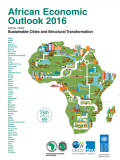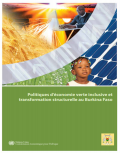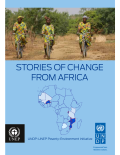In Burkina Faso, more effective macroeconomic management based on policies to promote sustained and sustainable growth remains a priority goal. However, it is now recognized that maintaining rapid growth is not synonymous with structural transformation or a rapid reduction in poverty. To achieve the above-mentioned goals, growth must be deliberately oriented towards sustainable, inclusive development, predicated in particular on a process of agricultural modernization, industrialization tailored to national circumstances and economic diversification which creates jobs, helps to lower poverty levels and gives wider access to basic services. Accordingly, an inclusive green economy, designed in a spirit of structural transformation, is increasingly recommending itself in policy and strategy debates as the most suitable way of bringing about sustainable economic and social transformation.

The African Economic Outlook (AEO) 2016 presents the current state of economic and social development in Africa and projects the outlook for the coming two years. The AEO is a product of collaborative work by three international partners: the African Development Bank, the OECD Development Centre and the United Nations Development Programme.
The AEO 2016 shows that the continent is performing well in regard to economic, social and governance issues and has encouraging prospects for the near future. With its special theme on sustainable cities and structural transformation, this edition looks closely at Africa’s distinctive pathways towards urbanisation and at how this is increasingly shifting economic resources towards more productive activities.

In Burkina Faso, more effective macroeconomic management based on policies to promote sustained and sustainable growth remains a priority goal. However, it is now recognized that maintaining rapid growth is not synonymous with structural transformation or a rapid reduction in poverty. To achieve the above-mentioned goals, growth must be deliberately oriented towards sustainable, inclusive development, predicated in particular on a process of agricultural modernization, industrialization tailored to national circumstances and economic diversification which creates jobs, helps to lower poverty levels and gives wider access to basic services. Accordingly, an inclusive green economy, designed in a spirit of structural transformation, is increasingly recommending itself in policy and strategy debates as the most suitable way of bringing about sustainable economic and social transformation.

